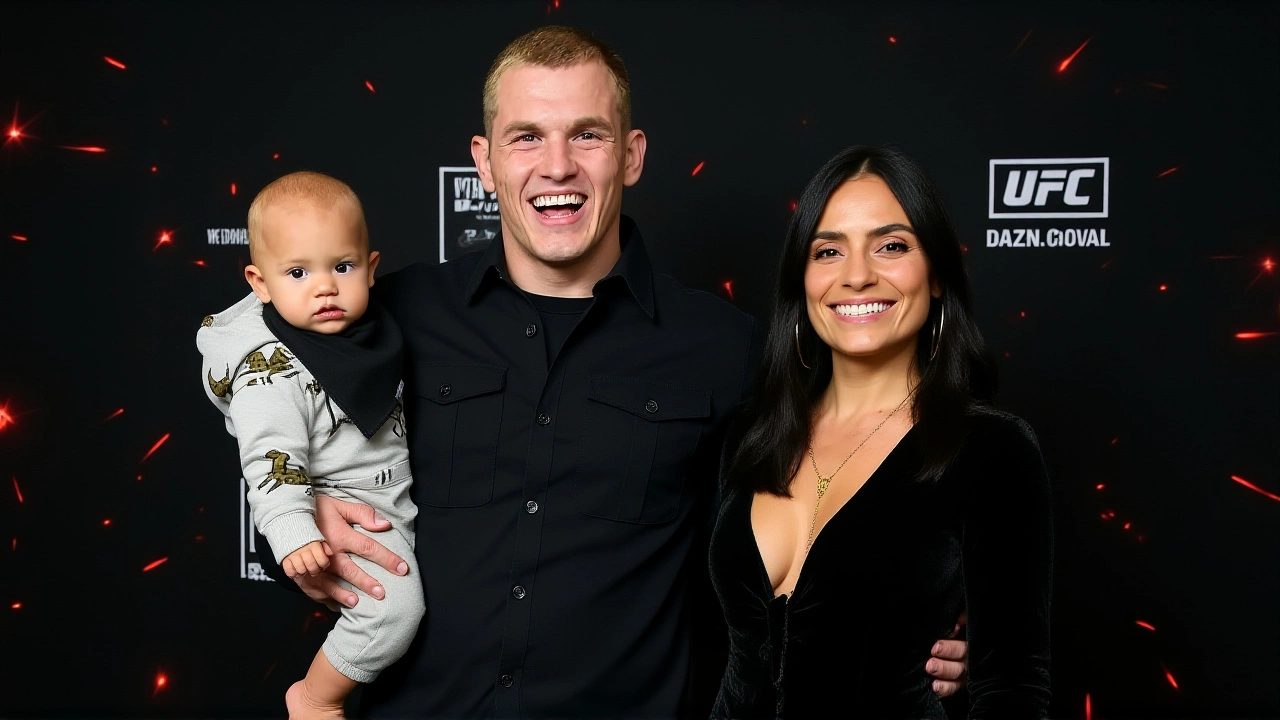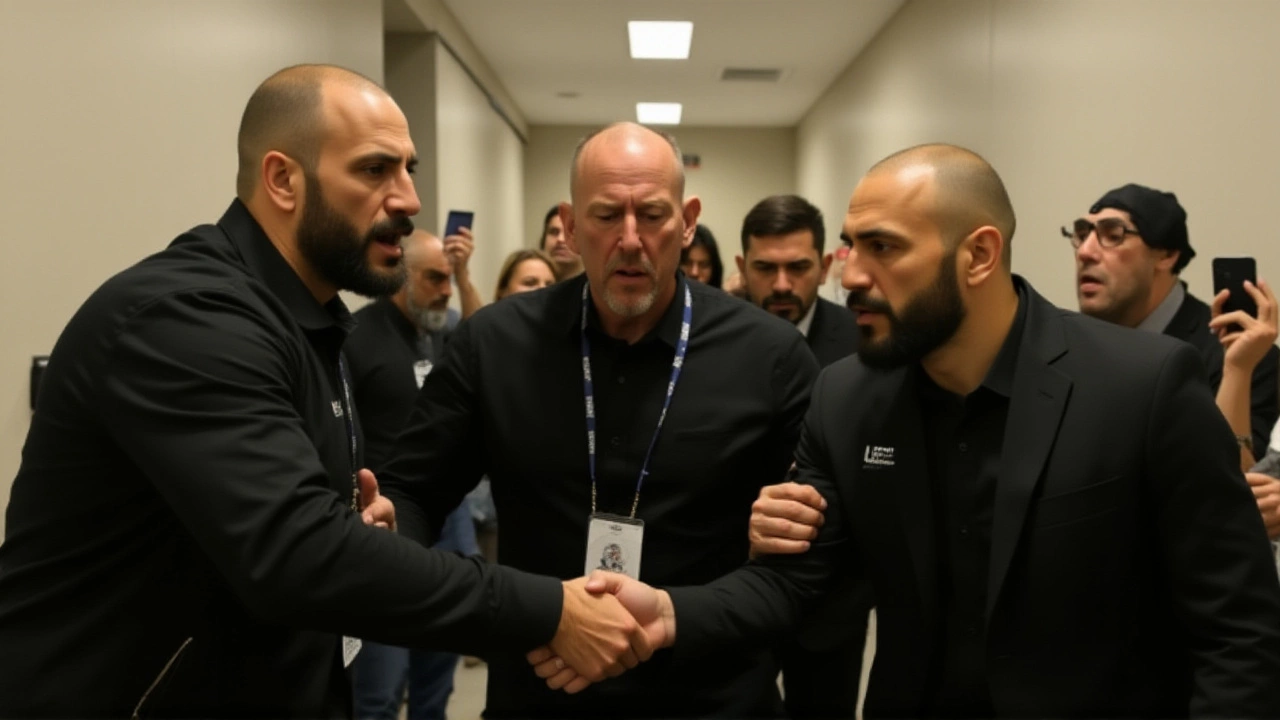It wasn’t the main event that shook UFC Qatar — it was what happened 15 minutes after the final bell. On Saturday, November 22, 2025, at approximately 11:00 PM UTC, Khamzat Chimaev shoved Ian Machado Garry backstage at the Lusail Sports Arena in Lusail, Qatar, after Garry made incendiary comments targeting Dagestani fighters. The shove, caught on multiple camera angles and later leaked to MMA Fighting and MMA Mania, wasn’t just a moment of rage — it was the boiling point of years of cultural and regional friction in MMA’s most volatile weight classes.
The Spark: Words That Ignited a Fight
Just minutes after the main event ended, Garry, 27, stood at the media podium, still in his fight gear, speaking with the raw intensity of a man who’d just survived a war. He didn’t just talk about Chimaev — he declared war on an entire region. "We’re going to stop the Dagistanis from having that success," he said, according to audio recordings from TNT Sports. "And we’re going to shut him down and take his head clean off his shoulders." That wasn’t just trash talk. It was a direct challenge to the legacy of Dagestani fighters — a group that has dominated UFC welterweight and middleweight divisions for over a decade. Chimaev, 31, trained at KHK MMA in Bahrain and is the most visible face of that legacy. He didn’t respond with words. He walked up, stared Garry down, and shoved him hard against a production case.
The Aftermath: Chaos Behind the Curtain
Three UFC officials on site confirmed the shove was unprovoked physically — but not emotionally. Garry had spent over 10 minutes before the incident mocking Chimaev’s style, referencing past opponents like Bal Muhammad and Islam Makashev, and even suggesting he’d fight "in Dagistan, Russia" if given the chance. "He knows it deep down," Garry said, referencing Chimaev’s perceived fear of facing him. "That’s why I want that fight back." The shove sent Garry stumbling. He didn’t retaliate. But the room froze. Two UFC security officers and four members of Chimaev’s team — including nutritionist Abubakar Nurmagomedov and head coach Javier Mendez — rushed in. No punches were thrown. No blood was drawn. But the message was clear: in this sport, words have consequences.
The Players: Two Fighters, Two Worlds
Garry, a product of Straight Blast Gym Ireland under coach John Kavanagh, is the rising Irish star with a knack for flashy striking and brash confidence. He’s never lost in the UFC, and his charisma has made him a fan favorite — and a lightning rod for controversy.
Chimaev, by contrast, is the quiet storm. A Dagestani native who moved to Sweden as a teenager, then trained in Bahrain, he speaks little but fights like a force of nature. His last three wins came by first-round knockout or submission. He doesn’t need to talk. His record does it for him.
The tension between them isn’t personal — it’s geopolitical. Dagestan has produced more UFC champions per capita than any region on Earth. Garry’s comments tapped into a deep well of resentment among Western fighters who feel they’re constantly overshadowed by a system they perceive as militarized and monolithic. Chimaev’s reaction? A shove. Not a punch. But in MMA, that’s often enough.
The Fallout: UFC’s Tightrope Walk
UFC President Dana White didn’t waste time. At 1:15 AM UTC on November 23, his spokesperson confirmed both fighters would face review by the UFC’s internal operations committee on November 25 at the UFC Performance Institute in Las Vegas. The rules are clear: any physical altercation between athletes can result in fines up to 30% of fight purses or suspension.
But here’s the twist — no formal complaint was filed with Qatari authorities. That’s significant. In a country with strict public conduct laws, the UFC chose to handle it internally. Why? Because this isn’t just about one shove. It’s about identity, pride, and the unspoken code of MMA.
Chimaev has never been suspended. Garry has never been fined. Both are cornerstones of the UFC’s current roster. Punish one too harshly, and you alienate a fanbase. Don’t punish at all, and you signal that hate speech is acceptable.

What’s Next? The Fight That Could Change Everything
Here’s the thing: neither man has officially requested this fight. But now? It’s inevitable.
Chimaev, who’s been linked to a potential middleweight title shot against Alex Pereira, might have to wait. Garry, fresh off a win over Michael Morales, is slated for a top-5 welterweight contender next. But the UFC’s internal committee will likely push them together — not just for pay-per-view dollars, but because the narrative is now too powerful to ignore.
And if they do fight? It won’t just be about belts. It’ll be about who gets to define the future of this sport. Will it be the articulate, charismatic outsider? Or the silent, relentless product of a system that refuses to fade?
Why This Matters Beyond the Octagon
This isn’t just another MMA feud. It’s a microcosm of global sport’s struggle with nationalism, representation, and respect. Dagestan’s fighters — from Khabib Nurmagomedov to Magomed Ankalaev — have changed how MMA is trained, fought, and perceived. But they’ve also been reduced to stereotypes: "the Russian machine," "the Dagestani wave." Garry’s words weren’t just offensive — they were reductive. And Chimaev’s shove? It was the only language left.
For fans, it’s a reminder: behind the gloves and the highlight reels, these are real men carrying real burdens. And sometimes, when words fail, the body speaks.
Frequently Asked Questions
What led to the altercation between Khamzat Chimaev and Ian Machado Garry?
The altercation was triggered by Garry’s on-camera comments targeting Dagestani fighters, including declaring he’d "shut down" Chimaev and "take his head off." These remarks, made during a post-fight interview, were perceived as a direct insult to Chimaev’s heritage and the legacy of fighters from Dagestan. Chimaev, who had been listening nearby, approached Garry and shoved him — a physical response to what he saw as a cultural attack.
Who are the key figures involved in the incident?
The primary figures are Khamzat Chimaev, a UFC middleweight fighter from Dagestan, Russia, trained at KHK MMA in Bahrain, and Ian Machado Garry, a rising welterweight from Ireland trained at Straight Blast Gym Ireland. Key support figures include Chimaev’s head coach Javier Mendez and nutritionist Abubakar Nurmagomedov, who helped break up the incident, and UFC President Dana White, who ordered the disciplinary review.
What are the potential consequences for the fighters?
The UFC’s internal operations committee will review the incident on November 25, 2025, at the UFC Performance Institute in Las Vegas. Penalties could include fines of up to 30% of their fight purses, suspension from competition, mandatory sensitivity training, or public apologies. No formal charges were filed with Qatari authorities, meaning the UFC is handling this internally — a sign they want to control the narrative.
Is a fight between Chimaev and Garry now guaranteed?
Not officially — but it’s now the most anticipated matchup in the UFC’s upcoming calendar. Both fighters are on winning streaks, and the media frenzy surrounding the shove has made this fight a guaranteed pay-per-view draw. UFC officials are expected to officially book it within the next 60 days, likely for a February 2026 event in the U.S. or U.K.
Why did this happen at UFC Qatar and not elsewhere?
UFC Qatar was the first pay-per-view event in the country since 2019, held at the massive Lusail Sports Arena. The high-stakes environment, combined with intense global media scrutiny and the emotional weight of the main event, created a pressure cooker. Backstage areas were packed with media, and Garry’s comments were made in front of live microphones — giving Chimaev no room to walk away without losing face.
How does this compare to past UFC altercations?
Unlike the 2018 brawl between Conor McGregor and Nate Diaz, which was premeditated and involved multiple fighters, this was a spontaneous, one-on-one reaction to words — not a planned confrontation. It’s more similar to the 2021 incident between Michael Chandler and Dan Hooker, where verbal disrespect led to physical tension, but this time, the stakes are higher due to cultural and regional identity elements.
